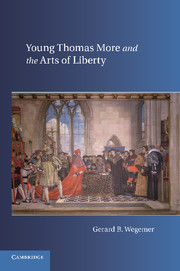Book contents
- Frontmatter
- Contents
- List of Illustrations
- Acknowledgments
- List of Abbreviations
- 1 Young Thomas More
- 2 Fashioning Peace and Prosperity
- 3 Cicero's and More's First Citizens
- 4 More's Earliest Views of Humanitas, Libertas, and Respublica, 1500–1506
- 5 More's Life of Pico della Mirandola (c. 1504–1507)
- 6 More's 1509 Coronation Ode
- 7 Political Poems of 1509–1516
- 8 Richard III
- 9 Utopia
- 10 The Un-Utopian Thomas More Family Portrait
- 11 The Arts of Liberty
- Works Cited
- Index
9 - Utopia
A Model Respublica of Peace, Liberty, and Self-Government?
Published online by Cambridge University Press: 25 October 2011
- Frontmatter
- Contents
- List of Illustrations
- Acknowledgments
- List of Abbreviations
- 1 Young Thomas More
- 2 Fashioning Peace and Prosperity
- 3 Cicero's and More's First Citizens
- 4 More's Earliest Views of Humanitas, Libertas, and Respublica, 1500–1506
- 5 More's Life of Pico della Mirandola (c. 1504–1507)
- 6 More's 1509 Coronation Ode
- 7 Political Poems of 1509–1516
- 8 Richard III
- 9 Utopia
- 10 The Un-Utopian Thomas More Family Portrait
- 11 The Arts of Liberty
- Works Cited
- Index
Summary
[W]ell and wisely trained citizens you will hardly find anywhere.
Morus's introduction to Raphael's story, Utopia 52/30–54/1No force of rule is strong enough to be lasting if it labors under the weight of fear.
Cicero, De Officiis 2.23, 25You have either no image [of a true commonwealth], or a false one. But you should have been with me in Utopia.
Hythlodaeus to Morus, Utopia 106/13–14Raphael's passionate appeals for humanitas, justice, and peaceful free government are among the most powerful in world literature. So urgent and so vivid are they that many identify them completely as author Thomas More's. Are they? How do we know? And can we ever know if author More agrees with his character Morus?
Raphael's appeals to humanitas in Utopia are usually made while showing Utopia's superiority to the inhumane practices of other countries, especially England itself. Raphael vividly describes such practices as starving veterans maimed while fighting loyally for war-mongering kings but left with no means of livelihood; starving citizens hung for stealing grain needed for survival; war-bent kings hoarding gold needed by citizens for trade; and citizens “eaten by sheep” because of get-rich-quick schemes by callous sheep-barons. Such images show us a country stratified by wealth and poverty, by corrupt power and desperate need – the very conditions that Aristotle presented as the major causes of factions and civil war.
- Type
- Chapter
- Information
- Young Thomas More and the Arts of Liberty , pp. 139 - 159Publisher: Cambridge University PressPrint publication year: 2011



